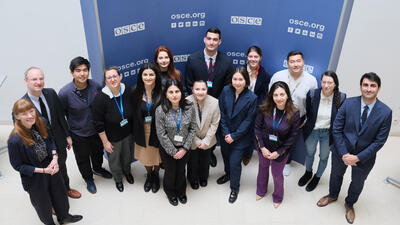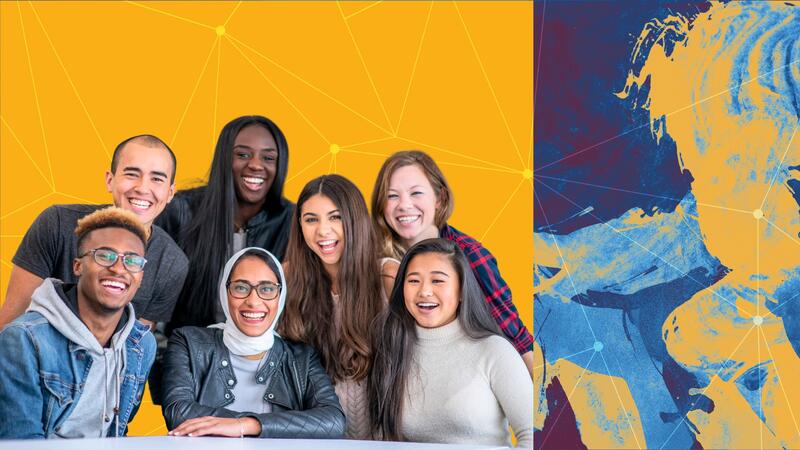-
Our work
-
Fields of work
- Arms control
- Border management
- Combating trafficking in human beings
- Conflict prevention and resolution
- Countering terrorism
- Cyber/ICT Security
- Democratization
- Economic activities
- Education
- Elections
- Environmental activities
- Gender equality
- Good governance
- Human rights
- Media freedom and development
- Migration
- National minority issues
- Policing
- Reform and co-operation in the security sector
- Roma and Sinti
- Rule of law
- Tolerance and non-discrimination
- Youth
- Field operations
- Projects
-
Meetings and conferences
- Summit meetings
- Review Conferences
- Ministerial Council meetings
- Plenary meetings of the Permanent Council
- Plenary Meetings of the Forum for Security Co-operation
- Security Review Conferences
- Annual Implementation Assessment Meetings
- Economic and Environmental Forum
- Economic and Environmental Dimension Implementation Meetings
- Human rights meetings
- Media conferences
- Cyber/ICT security conferences
- Conference of the Alliance against Trafficking in Persons
- Gender equality conferences
- Annual OSCE Mediterranean conferences
- Annual OSCE Asian conferences
- Partnerships
-
Fields of work
-
Countries
- All
-
Participating States
- Albania
- Andorra
- Armenia
- Austria
- Azerbaijan
- Belgium
- Belarus
- Bosnia and Herzegovina
- Bulgaria
- Canada
- Croatia
- Cyprus
- Czechia
- Denmark
- Estonia
- Finland
- France
- Georgia
- Germany
- Greece
- Holy See
- Hungary
- Iceland
- Ireland
- Italy
- Kazakhstan
- Kyrgyzstan
- Latvia
- Liechtenstein
- Lithuania
- Luxembourg
- Malta
- Moldova
- Monaco
- Mongolia
- Montenegro
- The Netherlands
- North Macedonia
- Norway
- Poland
- Portugal
- Romania
- Russian Federation
- San Marino
- Serbia
- Slovakia
- Slovenia
- Spain
- Sweden
- Switzerland – OSCE Chairpersonship 2026
- Tajikistan
- Türkiye
- Turkmenistan
- Ukraine
- United Kingdom
- United States of America
- Uzbekistan
- Asian Partners for Co-operation
- Mediterranean Partners for Co-operation
-
Structures and institutions
- Chairpersonship
-
Secretariat
- Secretary General
- Office of the Secretary General
- Conflict Prevention Centre
- Transnational Threats Department
- Office of the Special Representative and Co-ordinator for Combating Trafficking in Human Beings
- Office of the Co-ordinator of OSCE Economic and Environmental Activities
- Gender Issues Programme
- Opportunities for Youth
- Department of Human Resources
- Department of Management and Finance
- Office of Internal Oversight
- Documentation Centre in Prague
- Institutions
-
Field operations
- Presence in Albania
- Centre in Ashgabat
- Programme Office in Astana
- Programme Office in Bishkek
- Mission to Bosnia and Herzegovina
- Programme Office in Dushanbe
- Mission in Kosovo
- Mission to Moldova
- Mission to Montenegro
- Mission to Serbia
- Mission to Skopje
- Project Co-ordinator in Uzbekistan
- Closed field activities
- Parliamentary Assembly
- Court of Conciliation and Arbitration
- Organizational structure
- About us
OSCE Pool of Young Experts

Young people are the key to lasting, sustainable peace and security. They must be given a seat at the table in order to help shape a safer and more secure tomorrow.

Empowering young people and amplifying their voices in the peace and security debate is core to the work of the OSCE. We ensure that they are included in our work through various platforms, ranging from scholarships for further skill development, to participating in security discussions at conferences and workshops. It is within this context that the OSCE Pool of Young Experts (PYE) was initiated.
What is the OSCE Pool of Young Experts?
A database of young professional and leaders from the OSCE region, the PYE provides a platform for motivated youth to contribute to the work of the OSCE and global peace and security initiatives. The young professionals range between 18 and 30 years of age and are all alumni of OSCE activities. Their expertise in a diverse range of security topics stems from their academic background, their professional or civic engagements in public institutions, in the private sector or in civil society organizations, notably in the youth sector or youth-led organizations. PYE young experts do not work for the OSCE and do not represent the Organization nor the participating States of which they are nationals, allowing them to share their experiences and expertise as a young person in an individual capacity.
One of the most valuable things I’ve learned is that solutions to global challenges require multiple perspectives. Despite our diverse backgrounds, we share a common drive—to create a better, safer, and more inclusive future.
Being a young expert is both exciting and challenging, but it should never be intimidating. Instead, it should be embraced as an essential part of professional and personal development.
Direct exposure to real-world security challenges through fieldwork, humanitarian projects, or civil society work provides invaluable insights.
Being a young expert means continuously learning, adapting, and bringing fresh perspectives to international discussions. It involves balancing idealism with practicality while advocating for meaningful change.
What is the aim of the Pool of Young Experts?
- To promote the meaningful engagement of young people in peace and security debates;
- To allow the OSCE to shape its work in consideration of the contributions of young people; and
- To promote the work of the OSCE with and for youth.
How will it work?
Within the PYE, activities aim – (1) to facilitate the engagement of young experts in peace and security debates and (2) to strengthen young experts’ competencies.
- Facilitating the engagement of young experts in peace and security debates:
- A booklet that includes information about the young experts, including their areas of expertise and contact information, will be compiled and circulated within the OSCE to raise awareness of the pool and the availability of young experts for participating in OSCE events and activities. It should also facilitate networking between young people and OSCE professionals, as well as among youth.
- The Youth and Security Team and the OSCE Secretariat will proactively seek and identify opportunities and channels for involving young people from the PYE in OSCE activities. Some of the roles in which young people will be encouraged to contribute are through speaking engagements, co-facilitation or training roles, advising and providing input on specific topics and participation in intergenerational dialogue with OSCE leaders and officials.
- Activities to strengthen the skills and competencies of young experts:
- Mentorship opportunities between OSCE officials and young experts that are tailored to the needs and experiences of the young participants.
- Thematic webinars on a monthly basis that will feature two presenters of which one is a young expert. They will cover a range of security topics including conflict prevention and resolution, combatting human trafficking, and border management issues.
- Online and in-person skills workshops that will be led by two trainers, including one young expert. Topics include negotiation techniques and strategies, leadership and management, and public speaking, debating and engaging in dialogue.
